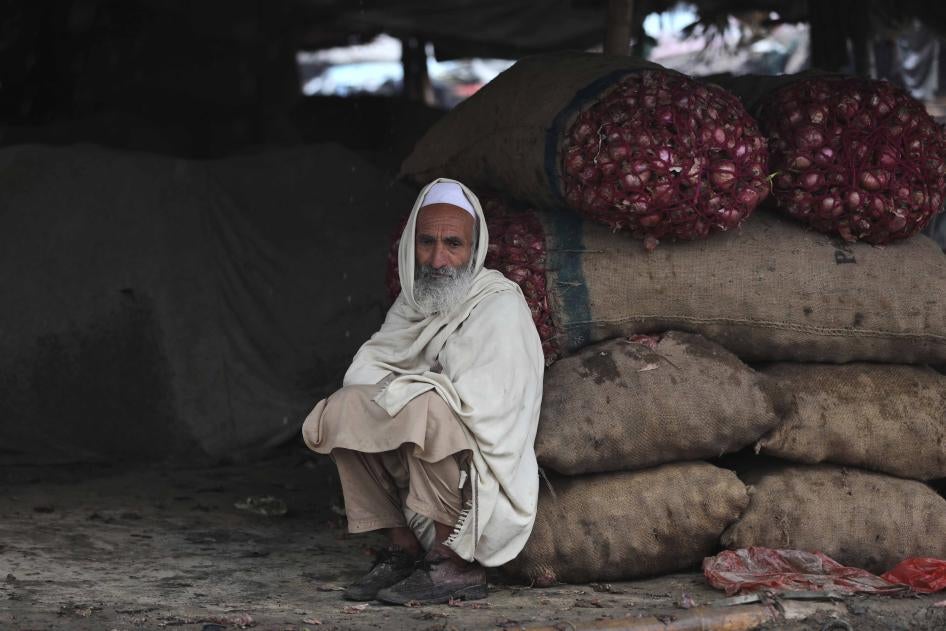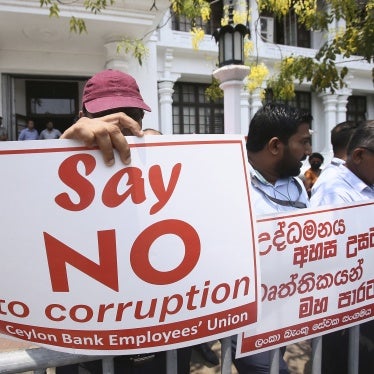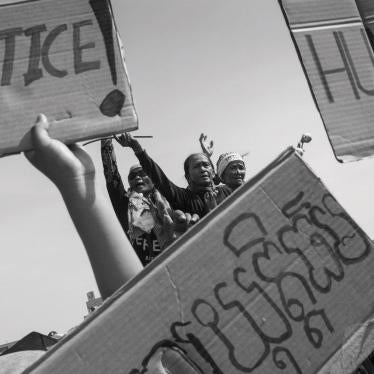(New York) – The International Monetary Fund (IMF) should work with Pakistan’s government to protect the economically disadvantaged by broadening social protection systems and minimizing reform measures that risk further harm to the most vulnerable people, Human Rights Watch said today. With poverty, inflation, and unemployment soaring, Pakistan is facing one of the worst economic crises in its history, jeopardizing millions of people’s rights to health, food, and an adequate standard of living.
The Pakistani government began formal negotiations with the IMF on February 1, 2023, to discuss a plan to rescue the economy, including an installment of US$1.1 billion in loans from a $6.5 billion bailout that had been designed to ward off economic meltdown in 2019.
“Millions of Pakistanis have been pushed into poverty and denied their fundamental social and economic rights,” said Patricia Gossman, associate Asia director at Human Rights Watch. “The IMF and the Pakistani government have a responsibility to address this crisis in a way that prioritizes and protects low-income people.”
Pakistan’s central bank’s foreign exchange reserves decreased by 16 percent, to $3 billion, in the week ending January 27, an amount covering less than three weeks of imports. Acute shortages of foreign currency mean that many imports, including essential medicines, are scarce or unobtainable. Pakistan is facing its highest inflation levels since 1975, with the cost of perishable food items rising more than 60 percent in January. Inflation is expected to continue to rise. In response to IMF demands, on January 29, the government increased fuel prices and removed a cap on the foreign exchange rate, leading to a drastic depreciation of the Pakistan rupee’s value, including a 9.6 percent loss in one day in January.
At least a quarter of Pakistan’s population was living below the poverty line well before this crisis. The World Food Programme estimated that in 2018, 21 percent of Pakistan’s population was undernourished and 44 percent of children under the age of 5 had stunted growth. The Asia Development Bank reported that for every 1,000 children born in Pakistan in 2020, 65 would die before their fifth birthday. Almost 25 percent of the population did not have access to electricity in 2020.
Pakistan’s social protection system, the Benazir Income Support Program (BISP), is a government cash transfer program that targets women living in extreme poverty. The program was initiated in 2008 to mitigate the impact of then-record levels of food and fuel inflation and continues to be Pakistan’s largest social safety net program. While the program is an important initiative assisting millions of households, it needs to be expanded significantly to protect large segments of the population from the added burden of potential additional IMF-mandated measures raising prices for necessities.
Pakistan’s negotiations with the IMF, which continue through February 9, are meant to clear the IMF’s ninth review of its Extended Fund Facility, aimed at helping countries with balance-of-payments crises. The IMF bailout installment would ease the crippling shortage of foreign exchange and unlock access to other funding, including from multilateral and bilateral donors.
Pakistan is a party to the International Covenant on Economic, Social and Cultural Rights, which protects the rights to health, food, housing, and an adequate standard of living, among others. The conditions the IMF places on this loan could either exacerbate social and economic hardship or provide desperately needed relief to Pakistanis while addressing the crisis’s underlying causes. Several adjustments proposed by the IMF as conditions for Pakistan to get the IMF loan and address the immediate economic crisis would have both a direct and indirect negative impact on low-income people.
The IMF, in addition to asking Pakistan to remove energy and fuel subsidies and move to a market-based exchange rate, has asked Pakistan to increase its general sales tax rate to a minimum of 18 percent from 17 percent at present, to raise more taxes, media reported. However, a depreciating local currency, skyrocketing inflation, and the removal of subsidies for electricity and fuel have already made it harder for many people to meet their basic needs. Increasing value added taxes instead of imposing progressive taxes will hit hardest on the people already most heavily affected.
The IMF program should conduct a thorough assessment of the direct and indirect impact these adjustments would have on low-income people and adequately mitigate them, Human Rights Watch said. It should use part of the anticipated savings to strengthen social safety nets by including a structural benchmark to significantly broaden coverage and increase social spending. The IMF should urge Pakistan’s government to enact policies to increase women’s access to employment by reducing barriers, including by providing state-funded maternity leave and access to affordable menstrual hygiene.
New tax measures should be progressive in nature and should not exacerbate inequality and increase the cost of living in ways that undermine rights. Any cuts in subsidies for electricity, fuel, and natural gas should be preceded by a comprehensive reform plan that ensures everyone is able to access energy supplies essential for basic rights.
The IMF’s recommendations should encourage government spending on social services, such as education, health care, and poverty-reduction programs while shoring up government revenues by improving the tax collection infrastructure and adopting stringent and transparent accountability measures. The IMF should use its procedures to make needed funds available as soon as possible, putting into place safeguards to protect people’s economic and social rights.
Pakistan’s deepening economic crisis comes amid devastation caused by cataclysmic floods. Floods in August 2022 killed over 1,700 people and destroyed hundreds of thousands of homes and millions of acres of crops, affecting more than 30 million Pakistanis and causing billions of dollars in damage. Forty percent of Pakistan’s 230 million people faced food insecurity in 2020, yet only 8.9 million families received assistance to mitigate the impact of rampant inflation. Poverty is concentrated in rural areas, which were particularly hard-hit by the floods.
“Pakistan’s government should use the influx of funds to expand support for those worst- affected by the economic crisis,” Gossman said. “The IMF should provide Pakistan the time and flexibility to achieve a sustainable, inclusive, and rights-based recovery.”









